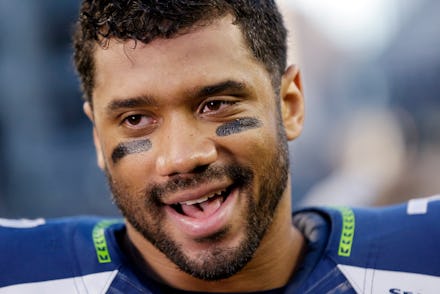Russell Wilson Race: What the Fascination Says About Us

As Seattle Seahawks quarterback Russell Wilson gears up to play a second consecutive Super Bowl, there's another issue bubbling under the surface.
According to data from Google Trends, the search term "Russell Wilson race" reached its two highest peaks during both the 2013 and 2014 National Football League playoffs. And so far, based on partial data for January 2015, interest is spiking once again in the run-up to the team's third Super Bowl appearance.
This makes sense, as Wilson's popularity outside the Seahawks fan base is likely to rise during this high-profile period, when Americans' interest in football peaks. Wilson identifies as African-American with some Native American ancestry. But the search term is revealing: Why are so many Americans obsessed with Russell Wilson's racial background?
The levels of morbid curiosity moved away from the search engines and into mainstream conversations last October. Reports surfaced that some of Wilson's teammates allegedly questioned whether or not he was "black enough."
As Bleacher Report's Mike Freeman wrote: "There is also an element of race that needs to be discussed. My feeling on this — and it's backed up by several interviews with Seahawks players — is that some of the black players think Wilson isn't black enough." Freeman went on to explain, "This is an issue that extends outside of football, into African-American society — though it's gotten better recently. Well-spoken blacks are seen by some other blacks as not completely black. Some of this is at play."
These inquiries about Wilson, by media and public alike, also fit a common social pattern. His physical appearance, specifically his hair texture and medium-to-fair skin tone, don't fit a stereotypical African-American archetype, prompting some to wonder about his racial or ethnic background. Couple that with how "well" Wilson speaks and becomes a classic case of ignorance based on the same limiting racial tropes that have dogged President Obama, Donovan McNabb and many others.
Besides their inherently ignorant and insulting undertones, questions about Wilson's race obscure his accomplishments. Following the Seahawks' Super Bowl victory last year, Wilson noted that no one mentioned the fact that he was only the second black quarterback to win the coveted championship. And this is a league that has been integrated for more than 50 years. In a July 2014 column for Sports Illustrated, Wilson said the first time he heard the achievement mentioned publicly was during the team's reception at the White House.
"The amazing thing was, I knew. I knew, after the game, the history of it. It matters because our world is changing — for the better," Wilson wrote. "America's hearts are changing, and the NFL is changing too. The NFL is moving forward." Wilson notes that team officials are most concerned with his performance. This needless debate about racial authenticity does a disservice both to his legacy and to African-Americans in general.
For his part, Wilson and some of his fellow black teammates have shrugged off questions over how legitimate or authentic his racial identity may be. "About me not being black enough, I don't even know what that means," Wilson said, according to CBS Sports. "I believe I'm an educated young male that's not perfect but tries to do things right. ... I try to lead by example and help others. That's all I focus on, and that's all I know."
And that's how it should be. Although the U.S. is nowhere close to eradicating racism on both social and institutional levels, it's still possible to acknowledge the gains made while celebrating and affirming diversity. During media day for this year's Super Bowl, as USA Today reported, no one asked questions related to Wilson's race until he made mention of it. Now it's time for the rest of America to follow suit.